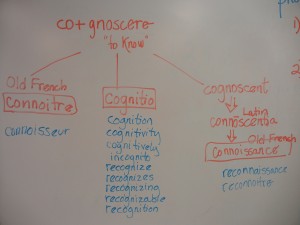There is so much to introduce at the beginning of each school year. It’s like walking through a brambly woods. The brambles are a tangled mess of new vocabulary, new procedures, and a system for organizing writing, science, orthography, reading, and math. As the students begin to get a handle on routines and the terminology that will become the foundation in each subject area, the brambles begin to shrink and whither away. It is then that we breathe a collective sigh. It is then that the big in-depth discoveries happen as we step into the frontier that lies ahead.
Late last week I wanted to model how we would conduct a full fledged word investigation. We chose the word <cognitive> because it is used in a quote that is posted in the front of our room.
We found out that cognition is concerned with the acquisition of knowledge and is related to thought. The students went in search of relatives and found the following:
cognitive
cognitively
cognitivity
noncognitive
cognition
recognition
cognizant
cognizance
recognize
recognizes
recognizable
recognizing
Looking at the above list, students made hypotheses regarding the word sum for <cognitive>.
<cognit> + <ive> or <cognite/> + <ive>
<co> + <gnit> + <ive>
Next we looked for its origin at Etymonline and found that <cognitive> is from the 1580s, from Latin <cognit->, past participle stem of <cognoscere> + <ive>.
We followed a link to <cognizance> and we found that it’s from mid-14C, from Anglo-French conysance “recognition”, later, “knowledge”, from Old French conoissance “acquaintance, recognition; knowledge, wisdom” (Modern French connaissance), from past participle of conoistre “to know” from Latin cognoscere “to get to know, recognize”, from com- “together” <co-> + <gnoscere> “to know”. The <g> was restored in English spelling 15c. and has gradually affected the pronunciation, which was always “con-“. The old pronunciation lingered longest in legal use.
So at Etymonline we found that <cognitive> comes from the Latin <cognit->, and <cognizance> comes from Latin <cognoscere>. We see evidence here that <co> may be a prefix in the latter, but not any clear evidence that <co> is a prefix in <cognitive>. Interesting, but we definitely need to gather more information.
The next resource I checked with was the Collins Gage Canadian Dictionary. The entry for <cognition> states that it comes from Latin cognitio from cognoscere; <co> + <gnoscere>.
I also looked in Bloomsbury’s Dictionary of Word Origins and found that <cognizance> is from Latin gnoscere and is related to know and notion. From it was derived the compound verb cognoscere. “Its present participial stem cognoscent- formed the basis of a Vulgar Latin noun connoscentia, which passed into Old French as connoissance. Also from the Latin present participle came Italian conoscente, which in its latinized form was borrowed into English as cognoscente in the 18th century. Meanwhile, the past participial stem of the Latin verb, cognit- produced the noun cognitio, source of Enlish cognition.”
Today we talked about how the spelling of one word can be altered over time. It was interesting to read that the <g> had been dropped, but then later made a reappearance. I made the columns on the board and as we decided where each of the words they had found belonged, we talked about the meaning of each. It was so interesting to listen to them tie each word back to the meaning of cognoscere. It was a lively discussion. Lots of eyebrows went up and smiles grew when I mentioned that I would love to be a connoisseur of fine chocolate. Ultimately though, the favorite word of the day was reconnoitre. Feeling it leave your mouth, it just doesn’t sound like a serious military word.



While, over my first coffee of the day, I was reconnoitring the day’s crop of new orthographic (we)blogs, I saw your fascinating study of the family to which ‘cognitive’ belongs.
Its final tree diagram headed with ‘co + gnoscere’ caught my eye. Every word in the diagram contains the prefix ‘co-‘, and that naturally provoked the question, does every word in this family have the prefix ‘co-‘?
To my delight, the OED confirmed that ‘a-‘ – an assimilated form of the Latin-origin prefix ‘ad-‘ – is also present in the verb ‘agnize’. And since ‘agnize’ is first attested in 1535, it’s been with us in English for nearly five hundred years.
Shakespeare uses it in Othello: “I doe agnize A naturall and prompt alacrity, I finde in hardnesse.”
In 1823 Charles Lamb wrote: “Well, I do agnize something of the sort.”
And in a recent history of the Ottoman Empire published in 2008 we read: “The concentration of power in the hands of local dynasts and notables brought about a de facto change in the land tenure system, compelling the government to agnize private ownership of land, albeit unofficially.”
Since, therefore, the verb to ‘agnize’ is clearly alive and kicking, I’m going to start using it myself. So…
Since the structure of ‘agnize’ must be ‘a + gn + ize’ and, therefore, the structure of ‘recognition’ must be ‘re + co + gn + ite/ + ion’ …
I can confidently say that I agnize the existence of the bound base element “know”.
Many thanks to you for the matutinal stimulation; I have learned something new today thanks to you, and I haven’t even had my breakfast yet.